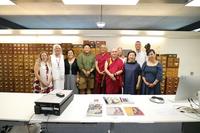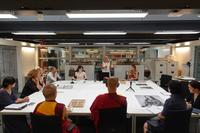Reanimating Tibet in the Museum

The project ‘Reanimating Tibet in the Museum: Key Stakeholder Workshop’ was an event designed to bring a group of distinguished Tibetan traditional knowledge keepers, educators, artists, and policy makers to Oxford to discuss the future of the large quantities of Tibetan material heritage held in the UK since the colonial era, including the museums at the University of Oxford. Building on a series of online workshops that have been held as part of the doctoral research of Thupten Kelsang on how to create a sustainable and equitable relationship between the exile Tibetan community and museums with Tibetan collections and supervised by Prof Clare Harris, this initiative was designed to bring representatives of the Tibetan community to Oxford in person to share and co-produce knowledge alongside Oxford University academics, student researchers, and curators. The Pitt Rivers Museum acted as the host institution. This project sought not only enable key figures from the Tibetan diaspora to access and re-engage with their material heritage but also work towards countering the historic absence of Tibetan voices in museums. The longer-term aim is to create a formal network with a Tibetan steering group at its core, to envision new modes of thinking, exhibiting, and producing knowledge on Tibetan material culture and developing a decolonising museum practice for the Tibetan context.
The workshops at the Pitt Rivers Museum (PRM) were conceived in collaboration with three departments – Collections, Conservation, and Public Engagement – allocating one morning session for each department. The first half of the morning session (10 AM – 11:30 AM) was for the department to share their expertise with the workshop group (e.g., a Public Engagement interactive session on learning from objects, questioning techniques, and decolonised approaches to learning). Followed by a coffee break, the second half (12 PM – 1:30 PM) was designated for discussion, allowing each department to seek expert guidance on Tibetan collections and gain clarity on sensitive ethical issues (such as treatment and display of human remains). The workshop sessions at PRM also included an extended meeting with the Director (Prof. Laura Van Broekhoven) to discuss long term plans. Additionally, this workshop group also visited the British Museum to review their ongoing thangka conservation survey and was able to engage with a contingent of senior staff at the Victoria and Albert Museum (including the Director Dr. Tristram Hunt) to discuss collaborative futures.

Thrupton Kelsang
Thupten Kelsang is a DPhil student at the School of Anthropology and Museum Ethnography, University of Oxford. His research and practice focus on creating sustainable and equitable relationships between the Tibetan community and museums; seeking to counter the acute absence of Tibetan voices in the field. Thupten’s doctoral research is supported by the Clarendon Fellowship, and he was also the recipient of the Inlaks Fellowship (India). He has extensive experience in multiple roles within museums: curator and consultant, doctoral researcher, museum activist, and community organiser. He has been consulted by major cultural institutions such the British Museum, the Pitt Rivers Museum, and the National Trust. His other qualifications include MSc in Visual, Material & Museum Anthropology (University of Oxford), MA in History of Art (SOAS), and Postgraduate Diploma in Asian Art (SOAS). Prior to pursuing his studies, Thupten worked towards developing his initiative the Tibetan Art Collective: speaking and consulting on Tibetan heritage at platforms such as the Kochi-Muziris Biennale and the Prince Claus Fund.
Email: thupten.kelsang@anthro.ox.ac.uk



